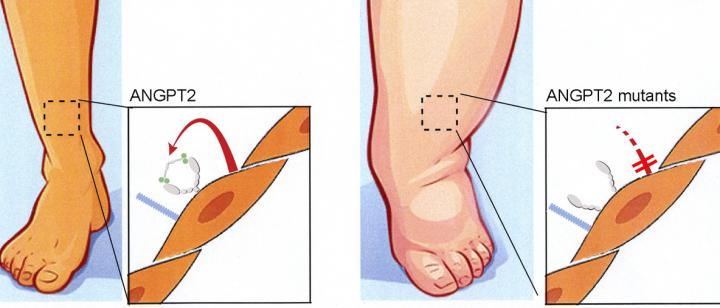Reseachers have made an important discovery how mutations in a novel gene, ANGPT2, cause a lymphatic disease called primary lymphedema. Discovery is essential for the proper diagnosis of patients suffering from primary lymphedema.

Credit: Alitalo Lab
The Human Molecular Genetics laboratory of the de Duve Institute (UCLouvain), headed by Professor Miikka Vikkula, recently identified mutations in a novel gene, ANGPT2, responsible for primary lymphedema. Together with the Wihuri Research Institute and it’s director Professor Kari Alitalo at the University of Helsinki, Finland, the laboratories could show how these mutations cause the disease.
“The mutations result in loss of the normal function of the ANGPT2 protein that is known to play a role in lymphatic and blood vessel maturation. This important discovery opens possibilities for the development of improved treatments of lymphedema”, explains Professor Alitalo.
The discovery is recently published in Science Translational Medicine.
Influence of the ANGPT2 gene mutations causing lymphedema shown in humans for the first time
Lymphedema is a strongly invalidating chronic disease resulting from abnormal development or function of the lymphatic system. In the patients, lymph is poorly drained from tissues, thus it accumulates in e.g. the legs or arms, causing swelling, and fibrosis, limiting the mobility of the affected body part and increasing the likelihood of infections in it. Lymphedema can be either primary, when there is no known underlying cause, or secondary, when it results from removed or damaged lymph vessels, e.g. after surgery, infection or cancer treatment. Primary lymphedema is often inherited.
The team of the de Duve Institute with its large international network of collaborators, including the Center for Vascular Anomalies and the Center for Medical Genetics of the Saint-Luc hospital in Brussels, has collected samples from almost 900 patients (and family members) suffering from primary lymphedema. By using whole-exome sequencing (i.e. the sequencing of all the coding parts of the genes in our genome), mutations in ANGPT2 were discovered in lymphedema patients from five families.
The ANGPT2 encodes the angiopoietin 2 protein, a growth factor that binds to receptors in blood and lymphatic vessels that were first identified in Professor Alitalo’s laboratory.
“ANGPT2 has previously been shown to influence lymphatic development in mice, but this is the first time when mutations in this gene were found to cause lymphedema in humans”, says Professor Alitalo.
New information on mechanisms that lead to lymphedema
Among the identified mutations, one deletes one copy of the entire gene, whereas the four other ones are amino acid substitutions.
The researchers showed that three of the mutants are not properly secreted from cells that normally produce the protein, and this decreases also the secretion of the protein produced from the remaining normal allele. Thus the mutations had a so called dominant-negative effect. The fourth mutant was hyper-active in inducing increased proliferation of dilated lymphatic vessels. This mutant demonstrated altered integrin binding.
The mutations that resulted in primary lymphedema in patients provided investigators important insights into the function of the ANGPT2 protein and mechanisms that lead to lymphedema.
Identifying the genetic causes crucial for a better management of the disease
In Europe, over a million people are affected by lymphedema. Therapy is limited to repeated manual lymphatic massage and use of compressive garments that are intended to decrease tissue swelling. In some cases, surgery may be helpful. Another lymphatic vessel growth factor, VEGF-C, is currently undergoing clinical trial in combination with surgery for the treatment of lymphedema in patients whose lymph nodes in the armpit have been removed due to breast cancer metastasis. So far, no cure exists for lymphedema and only in a minority of cases it resolves or ameliorates with time.
“Identifying the genetic causes is crucial for a better management of the disease. It makes a more precise and reliable diagnosis possible, where today many people with the disease are still not diagnosed. As the newly published study shows, research on lymphedema leads to insight in the underlying cellular mechanisms, which may be targets for the development of new therapies”, Professor Alitalo continues.
###
Media Contact
Kari Alitalo, Professor, University of Helsinki
[email protected]
Original Source
https:/
Related Journal Article
http://dx.




